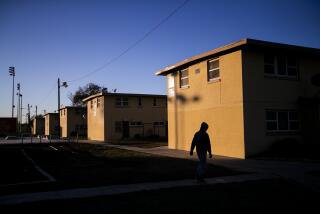Subpoenas Expand Sewage Probe
Five Huntington Beach city officials have been subpoenaed to testify before the Orange County Grand Jury next week in a criminal investigation into allegations the city failed to report massive sewage leaks during the 1990s.
Among those served with subpoenas are City Administrator Ray Silver, Public Works Director Bob Beardsley and Don Noble, who heads maintenance operations for the city’s Public Works Department. The grand jury is expected to begin taking testimony Wednesday.
The identities of the other two City Hall employees could not be confirmed.
The officials were subpoenaed by Dist. Atty. Tony Rackauckas, whose office is investigating the sewage discharges and whether they were properly reported to the state. The employees were told to bring documents detailing how and when millions of gallons of raw sewage began spilling from cracked and broken pipes underneath the downtown area of the city.
District attorney’s office spokeswoman Tori Richards confirmed that subpoenas were issued “in order that we may obtain documents and statements from them to aid in our investigation.” She declined to identify those called to testify.
Silver and Beardsley were out of town and could not be reached for comment Wednesday, and Noble did not return calls. City Atty. Gail Hutton also did not return telephone calls.
City officials acknowledged last week that they did not report the leaks to the state and had failed to “follow the letter of the law.” Still, they insisted the underground leaks never posed a health threat and that the crumbling state of the city’s downtown sewer system was well known. Some of the underground pipes are more than 80 years old and one link of the sewage system was missing three sections of 2-foot-wide pipes.
At issue is whether city officials withheld information about the leaking pipes during the initial search for the cause of the contamination that fouled the waters off the city’s famous shores for two months during the summer of 1999.
The grand jury probe marks the second criminal investigation involving Huntington Beach or its elected leaders. Councilman Dave Garofalo is under investigation by the district attorney’s office for possible violations of state conflict-of-interest laws.
Newly elected Councilwoman Debbie Cook said she and her colleagues were told of the grand jury subpoenas by Silver. Cook has openly questioned why it took city workers three years to begin repairing the leaky pipes.
“I think there’s a lot of blame to go around,” she said.
Former Assemblyman Scott Baugh (R-Huntington Beach) said delving into the sewage leaks is an appropriate use of the grand jury.
“The city should have nothing to fear if they properly disclosed [the leaks] under the law,” he said.
The California Regional Water Control Board this month ordered the city to find and clean up any residue from sewage that had leaked from the aging lines. Six-foot holes in the pipes were discovered in 1996 but work to fix them didn’t begin until 1999.
The water board ordered the city to submit a plan by Feb. 7 on how it will identify bacteria from the leaked sewage. The city also must determine whether any sewage reached the ocean.
City officials have insisted the leaking sewage wasn’t responsible for summertime beach closures. The shore was repeatedly sealed off because of elevated levels of bacteria. But city officials said the sewage that oozed from the pipes likely mixed with ocean water and remained trapped under the downtown area, never reaching the ocean.
City workers estimated in 1996 that 71,374 gallons of sewage were leaking each day, ballooning to a year-end figure of more than 6.6 million gallons. Current city officials now dispute those numbers.
The city’s former public works director--who served from 1995 to 1998--said Wednesday that city officials knew of the leaks in the mid-1990s, but there was never enough money to repair them. The city was particularly strapped because it lost about $3 million in the aftermath of Orange County’s 1994 bankruptcy.
“Unfortunately, there were a lot of cutbacks that had to happen” because of the bankruptcy, said Leslie M. Jones, now public works director for Garden Grove. “I have full confidence that the city did everything they could to get the repairs done as soon as possible.”
The existence of the leaks were reported by city officials “as far as I know,” Jones said.
State water officials said they only recently found out about the leaks, even though state law requires that such sewage spills be reported immediately.
The city considered a sewage-repair fee in 1996 to replace the worn and broken pipes but the council rejected the idea. After the beach closures during the summer of 1999, the city began a $1.8-million effort to repair some of the weak and broken pipes.
Cook said the council may vote next month to impose a fee to pay for another $6 million worth of work needed to fully repair the pipes.
More to Read
Sign up for Essential California
The most important California stories and recommendations in your inbox every morning.
You may occasionally receive promotional content from the Los Angeles Times.










